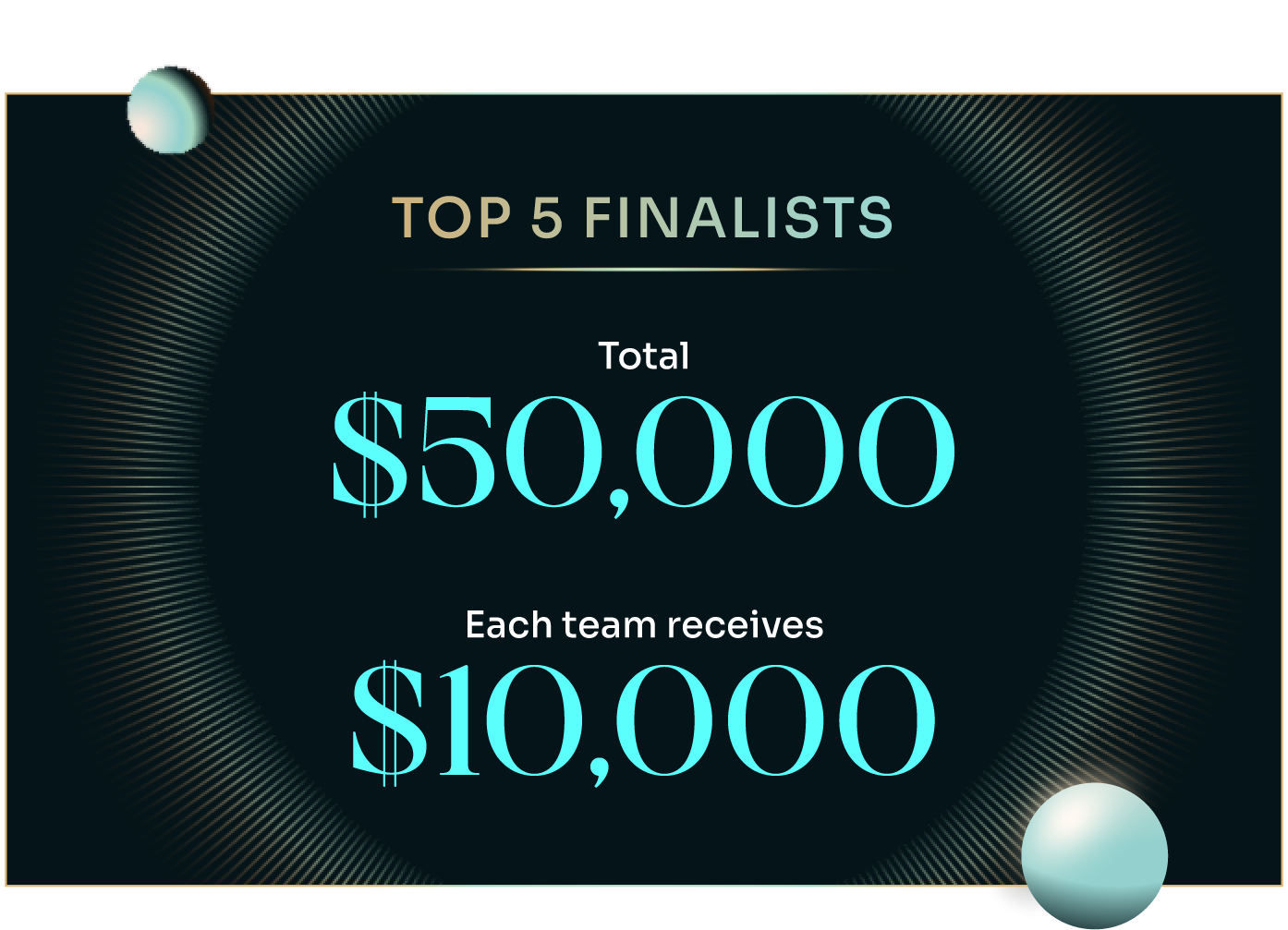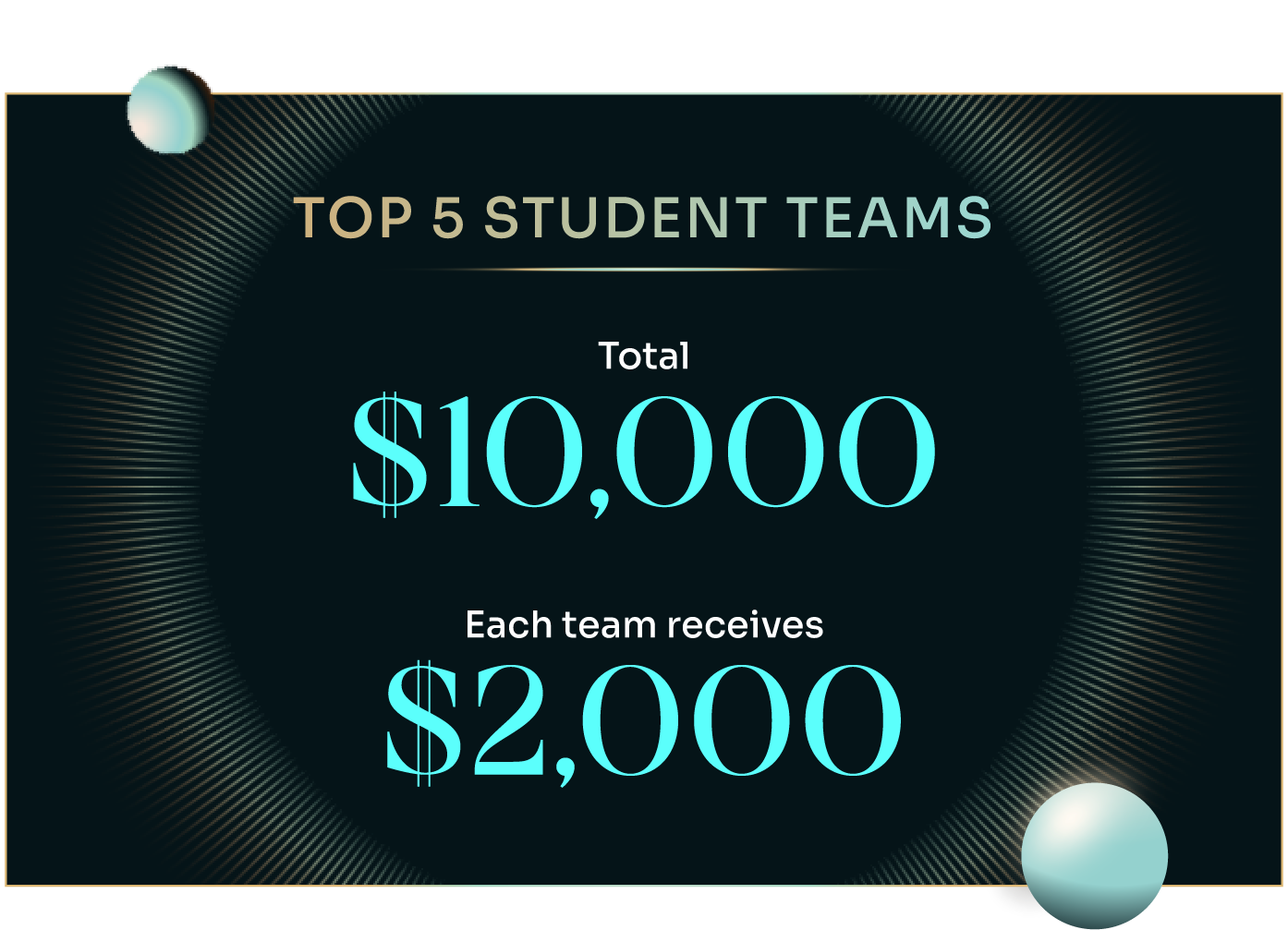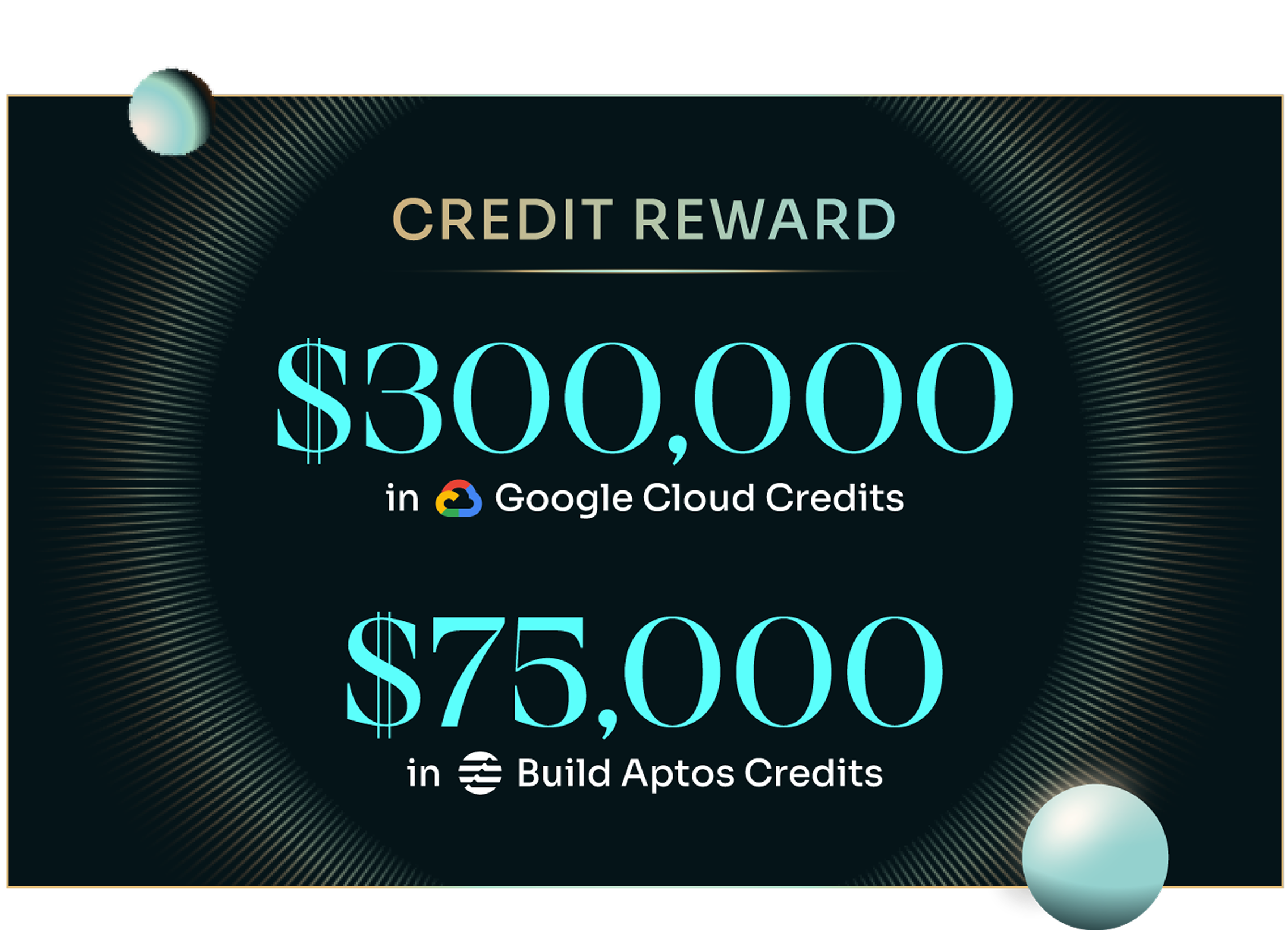Timeline
MAY 14 - AUGUST 2
May 14
Registration (online)
May 14 - June 19
Pre Hackathon workshops (university tour) & AMA
June 19 - July 18
Online/Offline Training, Online submission & Founder dinner
June 28 - June 29
AI x Blockchain Startup - Aptos Boost Camp
July 21 - July 25
Preliminary Review & Decision-Making Phase
August 2
Pitching and Awards (offline)
Total Prize: $400,000+



Tracks
Web3 Consumer
Develop decentralized applications that bring blockchain to mainstream users. Focuses on areas like Prediction Markets, SocialFi, GameFi, and Art & Culture within the Web3 space.
Payments and Finance
Includes real-time payments through subscriptions and streaming, micro-transactions in AI, DePin, and Gaming, as well as B2B and B2C payment solutions. It also explores micro-loans and the tokenization of Real-World Assets (RWAs).
Decentralized Infrastructure
Encompasses blockchain-based content delivery, data availability solutions, and integration of AI/ML infrastructure.
Strategic Partner




FAQ
Who is eligible to participate?
Throughout the hackathon, we’ll be hosting several training sessions to help expand your knowledge. Don’t hesitate to fill out the application form here and join us!"
Is the hackathon global or only limited to projects from Vietnam?
How to participate?
You need to register for the hackathon at this application form.
Please note that the deadline for registration is July 11, 2025
Do I need to register first before submitting a project?
How to submit my project?
You can submit your project here. The deadline for project submission is July 18, 2025. Please note that only one submission is allowed per team.
Can I join as a team or individual?
Both individual and team registrations are allowed. If you are participating as a team, the team leader only needs to fill out the registration form once, including the information of all team members.
If you need help finding teammates, please indicate your request in the registration form.
If you're unable to find team members, you may want to consider participating as an individual.
Can one individual/team submit multiple projects?
Each participant, whether as an individual or a team, is only allowed to make one submission.
Can one individual/team apply to multiple tracks?
Each project can only compete in one track, so it's important to choose the track that best showcases the potential of your idea or solution.
What is the hackathon timeline? Is the hackathon online or offline?
These are the important dates that participants should take note:
- May 14: Registration (online)
- May 14 - June 19: Pre Hackathon workshops (university tour) & AMA
- June 19 - July 18: Online/Offline Training, Online submission & Founder dinner
- July 21 - July 25: Preliminary Review & Decision-Making Phase
- August 2: Pitching and Awards (offline)
How will the workshops and mentoring process be held?
The detailed timeline and schedule for the workshops will be shared on social media and in the applicants' group chat, which participants will be added to after successful registration.
What are the prizes of the hackathon?
Vietnam Aptos Hackathon will have a total prize over $400,000, allocated between 3 tracks:
- Web3 Consumer
- Payments and Finance
- Decentralized Infrastructure
Do you have any programs to support developers after the hackathon
- Grants of up to $50,000 in cash and $200,000 in credits.
- Investment opportunities: up to $100,000 for Angel rounds and up to $1M for Seed rounds.
- Direct introductions to the Aptos Foundation for Series A/B fundraising, with support of up to $10M.
Am I required to come to Vietnam to participate in the hackathon?
The majority of the hackathon is online workshops and therefore does not require in-person participation. Only the projects named in the Winners result announcement are encouraged to participate in the Awards Ceremony at National Convention Center in Hanoi, Vietnam on August 2, 2025
Where can I access developer resources?
Development resources can be found here:
Where can I find project ideas?
We encourage projects to be innovative and explore creative ideas.
Web3 Consumer:
- Prediction Markets: Platforms like Augur and Polymarket enable users to speculate on the outcomes of future events, providing decentralized prediction markets.
- SocialFi: Projects such as FWB DAO and Rally integrate social networking with Web3, allowing users to earn and spend tokens based on social interaction.
- GameFi: Games like Axie Infinity, The Sandbox, and Decentraland are leading the GameFi trend, combining gaming with decentralized finance and tokenization.
- Art & Culture: Foundation, OpenSea, and SuperRare are marketplaces where creators can sell digital art as NFTs, allowing artists to tokenize their work and interact with their audiences in new ways.
Payments and Finance:
- Consumption-based real-time payments: Audius and Steemit offer consumption-based models where users pay for streaming content or services based on usage, rather than upfront subscriptions.
- Micro-transactions: Platforms like Brave and DeFi apps (e.g., Uniswap or Aave) facilitate small, real-time payments, particularly in gaming and DePin (Decentralized Physical Infrastructure Networks).
- B2B and B2C payment solutions: Circle's USDC and Stripe have begun integrating cryptocurrency and blockchain for more efficient payment solutions, while Shopify offers solutions for crypto payments in e-commerce.
- Micro-loans: Aave and Compound offer decentralized lending platforms, while new models like BlockFi and Celo provide micro-loans and credit with innovative blockchain frameworks.
- SocialFi apps, p2p, and influencer strategies: Pump.Fun, Mirror.xyz and Social Token platforms enable influencers and content creators to tokenize their influence, offering new avenues for p2p engagement and revenue models.
- RWAs and tokenization: RealT and Securitize focus on tokenizing real-world assets (RWAs), providing access to real estate or other traditional assets via blockchain technology.
Decentralized Infrastructure:
- Blockchain-based content delivery: Filecoin and Arweave offer decentralized storage and content delivery solutions, replacing traditional cloud storage.
- Data availability solutions: The Graph and Chainlink provide decentralized indexing and data retrieval services, ensuring the availability of off-chain data for decentralized applications.
- AI/ML infrastructure integration: SingularityNET and Ocean Protocol are examples of blockchain projects that focus on the integration of decentralized AI and machine learning models.
How will projects be judged?
Submissions will be graded by the Vietnam Aptos Hackathon judging panel. Judges will rely on the following criteria to evaluate each project:
- Product Maturity: (Mainnet on Aptos, Testnet on Aptos)
- Aptos On-chain Traction
- Team & Market Fit
Which information is required in the project submission form?
Vietnam Aptos Hackathon entries must provide the following information:
- Project name
- Project logo
- Short description about the project
- GitHub links to project source code .
- Links to the project demo page together with testing instructions.
- Presentation link, which can be provided in the form of a presentation slide and/or an introduction video (with a time limit of 10 minutes). This presentation should include all information on the project and highlight the best features and innovations to appeal to the judges, while at the same time being concise and comprehensive.
- Team Information, including each of the team members’ name, age, role, past experience, qualifications and achievements, geographic location, contacts (email, LinkedIn, other social media accounts)
- Project’s contact, including email, website, LinkedIn, social media accounts.
Where can I ask technical questions during the hackathon?
After your successful registration, you will be included in a builders’ group, where there will be a dedicated team from Vietnam Aptos Hackathon assisting you with every technical difficulties that you might encounter during the hackathon.